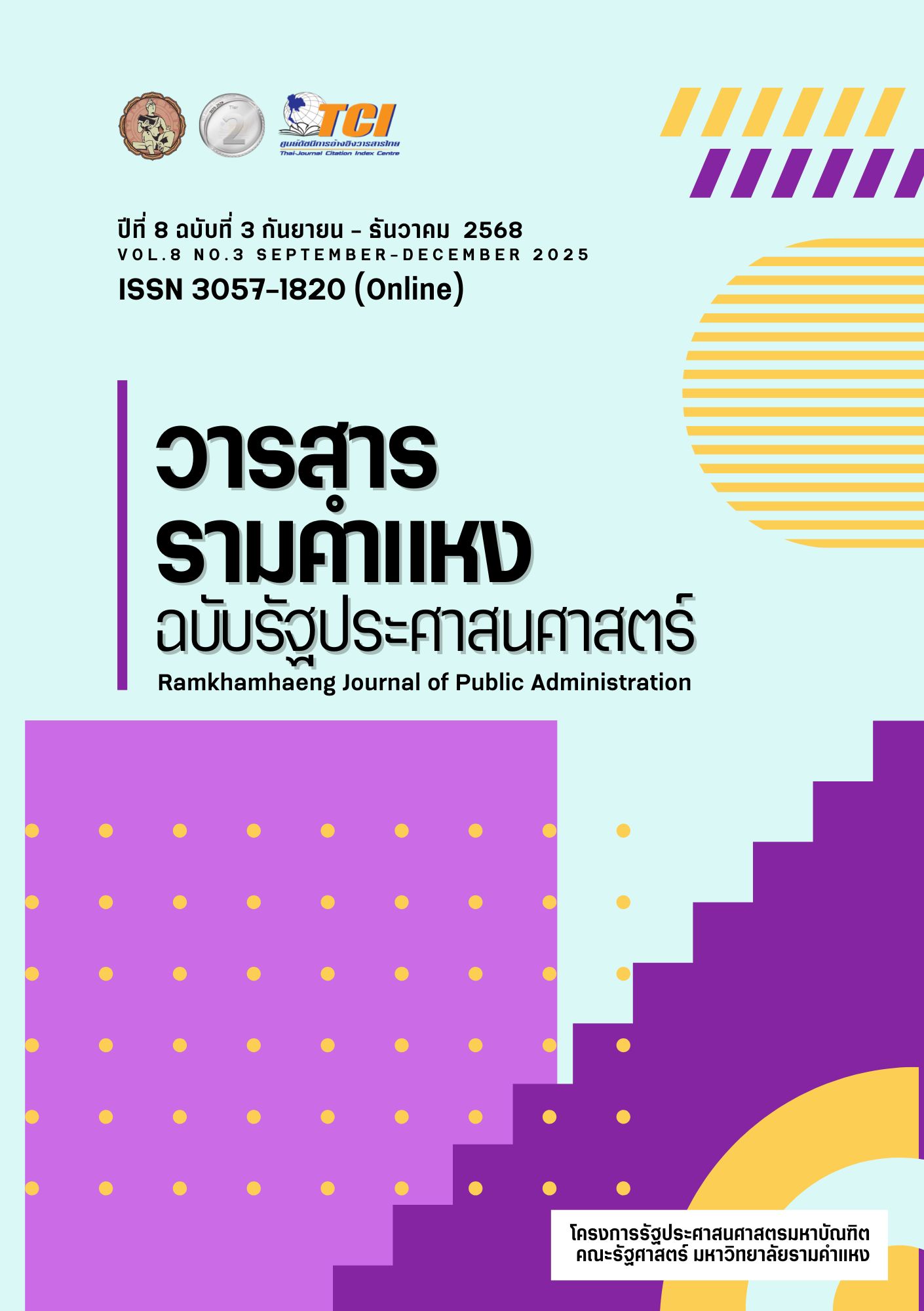Factors influencing youth political participation
Keywords:
Factors influencing, Political Participation, YouthAbstract
The aims of the research were to examines (1) the differences between young persons’ backgrounds and their political participation; investigates (2) the relationship between young persons’ political participation, the big five personality factors, meaning in life, and media use; studies (3) the factors influencing young persons’ political participation i.e. the big five personality factors, meaning in life, and media use. The technique of cross-sectional exploratory research was employed. A questionnaire was the research instrument to collect data. The analysis unit consisted of 400 young persons aged between eighteen and twenty-nine years studying at a university level using the technique of purposive sampling. The techniques of multiple regression analysis and stepwise selection were used in the hypothesis test. Findings are as follows: (1) The differences in young
persons’ backgrounds in the aspect of monthly income exhibited differences in the political participation at a statistically significant level. (2) The relationship between the big five personality factors, meaning in life, and media use exhibited young persons’ political participation. (3) The big five personality factors, meaning in life, and media use exhibited an influence on the young persons’ political participation.
References
Ahlskog, R. (2023). Extraversion probably does not cause political participation: Evidence from two genetically informed designs. Political Psychology, 44(6), 1301–1318. https://doi.org/10.1111/pops.12901
Alelaimat, M. S. (2019). Factors affecting political participation (Jordanian universities students’ voting: field study 2017–2018). Review of Economics and Political Science, 8(1), 54–67. https://doi.org/10.1108 /REPS-05-2019-0072
Alhassan, A., Siakwa, M., Kyereme, K. A., & Wombeogo, M. (2020). Barriers to and facilitators of nurses’ political participation in Ghana. Policy, Politics, & Nursing Practice, 21(1) 29–42. https://doi.org/10.1177 /1527154419899602
Badescu, G., & Sum, P. E. (2024). What’s your source?: Estimating the effects of media on youth political engagement in Southeast Europe. Journal of Southeast European and Black Sea Studies, 20, 1–23.
Baumeister, R. F. (1991). Meanings of life. New York: Guilford Press.
Brady, H. E., Verba, S., & Schlozman, K. L. (1995). Beyond SES: A resource model of political participation. The American Political Science Review, 89(2), 271–294. https://doi.org/10.2307/2082425
Cherry, K. (2017, April 5). The big five personality dimensions 5 major factors of personality.
https://psych532.files.wordpress.com/2017/04/cherry _about_ fivefactor_nodate.pdf
Chryssochoou, X., & Barrett, M. (2017). Civic and political engagement in youth: Findings and prospects. Zeitschrift fur Psychologie, 225(4), 291–301. https://doi.org/10.1027/2151-2604/a000315
Cooper, C. A., Golden, L., & Socha, A. (2013). The big five personality factors and mass politics. Journal of Applied Social Psychology, 43(1), 68–82.
Damon, W., Menon, J., & Bronk, K. C. (2003). The development of purpose during adolescence. Applied Developmental Science, 7(3), 119–128. https://doi.org/10.1207/S1532480XADS0703_2
Ekstrom, M. (2015). Young people’s everyday political talk: A social achievement of democratic engagement. Journal of Youth Studies, 19(1), 1–19. https://doi.org/10.1080/13676261.2015.1048207
Eriksson, M., & Mittelmark, M. B. (2017). Chapter 12 the sense of coherence and its measurement. In M. B. Mittelmark, S. M. Sagy, G. F., Bauer, J. M., Pelikan, B., Lindstrom, & G. A. Espnes, (eds.), The handbook of salutogenesis (pp. 97–106). Switzerland: Springer.
Fox, R. L., & Lawless, J. L. (2014). Uncovering the origins of the gender gap in political ambition. American Political Science Review, 108(3), 499–519. https://doi.org/10.111l/pops.12600
GDNET Research Communications. (2010, June 4). What is the media and how does it work. https://assets.publishing.service.gov.uk/media/57a08 acae5274a27 b2000785/Using_Media_to_communciate_research_output.pdf
George, L., & Park, C. L. (2016). Meaning in life as comprehension, purpose, and mattering: Toward integration and new research questions. Review of General Psychology, 20(3), 205–220. https://doi.org/10.1037/gpr0000077
Janusz, A., & Campos, L. A. (2021). Candidate advertisements and Afro–Brazilian political marginalization. Latin American Research Review, 56(4), 761–778. https://doi.org/10.25222/larr.888
Kim, Y., Hsu, S. H., & de Zuniga, H. G. (2013). Influence of social media use on discussion network heterogeneity and civic engagement: The moderating role of personality traits. Journal of Communication, 63, 498–516. https://doi.org/10.1111/jcom.12034
Kipkoech, G. (2023). Connections between internet, social media news use, and political participation in Kenya. Social Science Computer Review, 41(3), 871–885. https://doi.org/10.1177/08944393211058702
Downloads
Published
How to Cite
License
Copyright (c) 2025 กัลยาณัฐ วงษ์กำปั่น

This work is licensed under a Creative Commons Attribution-NonCommercial-NoDerivatives 4.0 International License.



